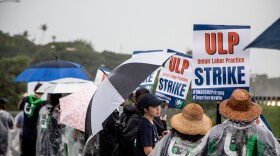This coming Veterans’ Day, we will likely hear stories of service from those who have been to the frontlines of war. As America honors those who served in the U.S. military, the conversation also centers on how the U.S. can serve its veterans. HPR Reporter Ku?uwehi Hiraishi shares the story of an often overlooked group of veterans who are hoping the country they served will return that obligation.
Believe it or not, serving in the U.S. military does not automatically qualify veterans for full health benefits. That’s the case for soldiers from three Pacific Island nations known as the freely-associated states.

“The Republic of the Marshall Islands, Federated States of Micronesia, and the Republic of Palau,” says Emi Chutaro, Executive Director of the Pacific Islands Health Officers Association or PIHOA.

The Honolulu-based non-profit advocates for health services in the U.S. affiliated Pacific Islands. This includes the freely associated states as well as the U.S. territories.

“The three U.S. territories – Guam, American Samoa, and the Common Wealth of the Northern Marianas Islands because they’re U.S. territories, they are fully eligible for VA services cause they are U.S. citizens,” says Chutaro, “It’s a different situation to the veterans that are coming from the freely associated states because they aren’t U.S. citizens.”

The federal law regulating veteran benefits does not allow the Department of Veterans Affairs to provide direct services on foreign soil, which means no VA clinics in the islands. And Chutaro says local health care is limited, especially for combat veterans like one she recalled from Pohnpei.

“He lost both of his arms and both of his legs. There are no special PT services, physical therapy services in Pohnpei…at all. None,” says Chutaro, “What he needed was you know physical therapy services to provide him more increased mobility, prosthetics, you know things of that nature. None of that is available in the islands.”
“It’s hard for veterans in the U.S. mainland. It’s hard for veterans in Hawai’i. But I think this is an invisible population in a lot of ways that doesn’t have a voice,” says Nathan Fitch.

Fitch is a New York filmmaker who documented the plight of soldiers from the Micronesian island of Kosrae who fought American wars in his film Island Soldiers.
“A lot of these Micronesians who are serving are enlisted from their islands and the materials that they are enlisted with promise certain benefits. The challenge they face is after serving they go home but there just isn’t a VA. There aren’t the same benefits,” says Fitch, “And so you know for health care, these veterans have to fly themselves back to Hawai?i and Guam which can be thousands of dollars.”

Residents from the freely associated states can work and live in the United States under a treaty they signed with the U.S. called the Compact of Free Association or COFA. The 1986 compact also allowed the U.S. to secure strategic military control over the North Pacific region. Ron Han directs the Hawai’i state Office of Veterans’ Services.

“These COFA veterans served their nation with distinction. A lot of them may have gotten injured in the line of duty or paid the ultimate sacrifice,” says Han, “We certainly would want to see them get the type of support that they would need for health care or any of the other benefits and entitlement requirements that are out there."

Chutaro says it comes down to resolving inconsistencies in the way the United States chooses to relate with COFA residents. They aren’t citizens but…
“In many other ways they are part of the United States,” says Chutaro, “They are eligible for other federal grant programs, they are using U.S. currency, they do defer, they have access to U.S. Supreme Court”
And they do risk their lives for the red, white, and blue.
Catch a glimpse of life for soldiers from the Micronesian island of Kosrae in this film Island Soldier:




